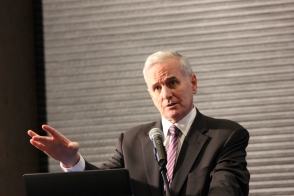The hand-wringing and the vote-counting are over.
Minnesota finally has a budget that protects the middle class, invests in our future, and protects the health of seniors.
It was no mean feat. The Governor and the legislative leaders had to hold fast to the right priorities through threats of filibusters, add-on amendments, and even talk of businesses exiting the state.
Governor Mark Dayton and legislative leadership had to rectify years of imbalanced budgets and re-invest in state programs that had been long ignored. In summary, the top 2 percent of wage earners will pay about 2 percent more in taxes, which will raise $1 billion dollars; cigarette and other tobacco taxes go up, which will raise another $600 million and hopefully convince some to quit; and they found money in the couch cushions too by closing corporate tax loopholes, which raises $424 million in business tax write-offs.
Doing all that meant the Governor could sign an $11.2 billion health and human services budget bill, which includes a 5 percent rate increase for nursing homes next year-much of that goes to workers who care for our seniors-along with another 3.2 percent increase by 2016. While some proposals saw health and human services losing $150 million, this investment ensures seniors will receive good quality care and their care-givers will be better paid for their priceless work. That keeps experienced nurses and care-givers protecting our seniors. Nurses at state facilities will also see a 2 percent raise retroactive to this year.
Legislative leaders needed to re-right the boat after eight years of no new taxes has denied Minnesota the ability to move forward and placed the middle-class in a squeeze from all their other taxes going up, including local property taxes, school levies, and other referenda. With a stable base of revenue coming into the state, Minnesotans should be able to count on their health, their children, and their seniors continuing to be cared for without worrying what the next year will bring.
